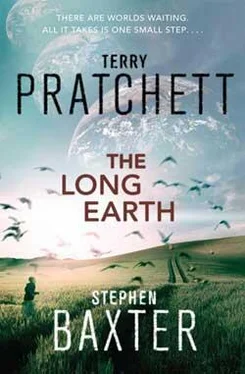In the morning, the little group, slightly hungover, tossed coins to select the one who would give it a go.
Billy came back half an hour later, retching horribly, arriving out of nowhere. They picked him up and gave him water, and waited. He opened his eyes and said, ‘It’s true, but it’s bloody raining over there, mates!’
They looked at one another.
Somebody said, ‘Yeah, but what about all those creatures I’ve heard about, back in the old time? Roos with teeth! Bloody big ones! Big creatures with claws!’
There was silence. Then Albert said, ‘Well, ain’t we as good as our ancestors? They saw off these buggers. Why can’t we?’
There was a shuffling of feet.
Finally Albert said, ‘Look, tomorrow, I’m going over for good. Who’s with me? It’s all there, mates. It’s all been left there waiting for us, since the beginning…’
By the end of the next day the songlines had begun to expand, as the never-never began to become the ever-ever. Although sometimes the blokes came back for a beer.
Later, there were towns, unfamiliar towns admittedly, and new ways of living, a mix of past and present, as old ways were seamlessly woven into new ones. The eating was good, too.
And later still, surveys showed that in the great post — Step Day migration a greater proportion of Australian Aborigines left Datum Earth for good than any other ethnic group on the planet.
Excerpts from the Journal of Helen Green, resceptfullyrespectfully spellchecked by Dad, aka Mr J. Green:
Here is the story
of how the Green family
walked across the Long Earth
to our new home .
February 11, 2026. We rode on a helicopter, yay! We are going to start out from Richmond West 10, that’s Richmond VirginaVirginia, because you have to trek from south of all the ice in the Ice Age worlds, and we went back to the Datum and we rode to Richmond on a helicopter!! But we had to say goodbye to Rod at Chicago airport and that was sad sad…
Jack Green had always had to do plenty of travelling in the course of his work in software, and in recent years travel had become a lot more interesting. Everybody made their long geographical trips on the Datum, with its elaborate transport networks. A Stepper would take you a thousand worlds stepwise but it wouldn’t give you a foot of lateral movement. So transport had become one of the few boom elements in the Datum’s slumping post-step economy. The Datum, in fact, was starting to look like the crossroads of the Long Earth.
And so you never knew who you might meet at the next rail station. Pioneer types, come back to buy a new set of bronze tools and to have their teeth fixed. High-tech hippies, trading goat cheese for mastitis cream. Once, a woman dressed like Pocahontas blissfully clutching a white wedding dress in a cellophane cover, and there was a whole short story just in her smile. People with new ways of living all jumbled up together in the Datum, at least for the duration of their journeys.
So for this last trip down to Richmond, Jack and Tilda had decided to treat the girls to a helicopter hop. In the future they would be riding in ox-drawn carts and dug-out canoes; why not let them enjoy a little high technology while they could?
Besides, it had distracted them from the distressing scene at the helipad where they had to say goodbye to Rod. Meryl, Tilda’s sister, was willing to take the boy, but she didn’t bother to hide her disapproval of how the family was being split up. And Rod, only thirteen years old, was blank. Jack suspected they had all been relieved when the chopper had finally lifted; he saw that small face upturned, the short-cut strawberry blond hair so like his mother’s, and they were on their way, the girls shrieking with delight.
Richmond West 10 was making a living as the mustering point for treks heading for stepwise editions of the eastern United States, including Tilda’s Company. Jack had had no idea what to expect.
He found himself standing in a bare earth street, in a grid pattern of houses built of heavy logs, clapboard, even lumps of sod. Hand-painted signs told him that the buildings on the main street included churches, banks, inns, hotels, stores offering food, clothing, and other essentials for the treks that began here. The Stars and Stripes fluttered from poles and rooftops, with a few Confederacy flags in amongst them. The place bustled with people, some of them clean-looking newcomers wearing bright artificial fabrics like the Greens, but most in worn-looking ‘frontier’ gear — much-patched jackets and trousers, even coats and cloaks of hand-cut leather. It all aped former times when Datum Richmond itself had been a trading post for furs, hides and tobacco, on the edge of an empty continent.
It was like a movie set for some old-fashioned western. Jack felt utterly out of place. He rubbed his stomach, willing away the stepping nausea.
The Prairie Marble Inn turned out to be named after what it was mostly built from — ‘prairie marble’, sod piled up around a wooden frame. It was gloomy, dank, but a big place, and heavily occupied. The woman behind the counter said the rest of their party was gathering in the ‘ballroom’, which was a barn with rough-hewn wooden furniture set out on a rag carpet. It was pretty full, with maybe a hundred people, mostly adults, a few children and infants. One man was speaking, a boisterous fellow with a spectacular mane of grey-blond hair. He was delivering some kind of lecture about the need for rotas. A few of the others turned to the newcomers, warily, some half-smiling.
Tilda smiled back. ‘Most of these are people I dealt with online when we set all this up. Never met them in person before …’
These, Jack reflected, might be the people he would be spending the rest of his life with. Total strangers. Jack had left it all to Tilda, but he understood that it took some skill to assemble a viable Company for a trek. You had your professional captains to lead you, along with scouts, guides, porters; they were relatively easy to find and hire. But the core of the party were the people who would be settling together a hundred thousand worlds away. You needed complementary skill types: tailors, carpenters, coopers, smiths, wheelwrights, millwrights, weavers, furniture makers. Doctors, of course — a dentist if you could find one. Tilda, after being rejected by the first Companies she had approached, had retrained herself, packaging herself as a teacher and historian. Jack had gone for basic farming skills — he felt he was physically fit enough for that — and for backup medical competences.
It struck Jack, on this first glance at his new companions, that they were mostly like him and Tilda. A mix of ethnicities, but they all looked prosperous enough, earnest, a little anxious — middleclass types setting off into the unknown. That was the classic profile of the Long Earth pioneer, just as, according to Tilda, it had been in the Old West. The very rich wouldn’t travel, for they were too comfortable back on the Datum to give it all up. And nor would the very poor, at least not in an organized party like this, for they didn’t have the means to pay for the trek itself. No, it was the middle classes who were heading off into the far West, especially those distressed in difficult economic times.
The blowhard on his feet was called Reese Henry, Jack gathered, some kind of salesman, a survivalist in his spare time. He had moved on from latrine rotas. ‘Once again young Americans are going out into the wild, to places where the streetlights do not shine, where there isn’t a cop at the other end of a cellphone connection. Urbanized, online, civilized, pampered and preened — and now pitched back into nature in the raw.’ He grinned. ‘Ladies and gentlemen, welcome back to reality.’
Читать дальше











